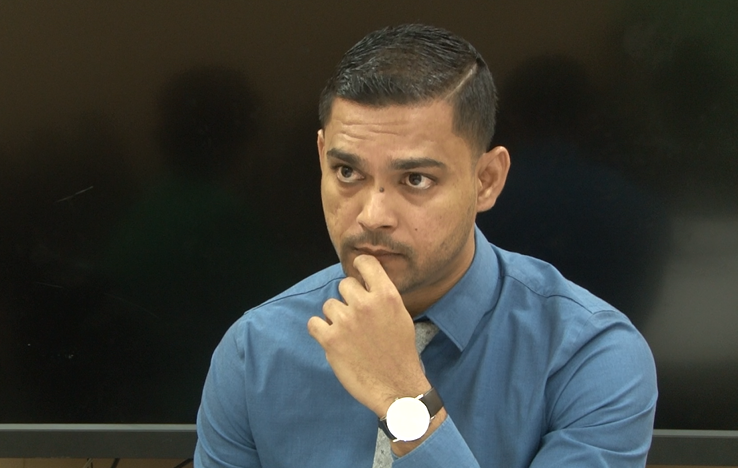By Devina Samaroo
Neurosurgeon, Dr Amarnauth Dukhi Monday said the 15-year-old national champion cyclist Beyonce Ross, who was diagnosed with a brain tumor three months ago, had very little chances of regaining consciousness following the seizure she experienced Thursday last.
Beyonce Ross at the Georgetown Public Hospital Corporation (GPHC) in the wee hours of Monday morning.
The brain tumor was located at a critical point – in the center of her brain – and though it was discovered only in March 2018, Dr Duhki said the disease was already well-advanced.
A brain tumor is basically a mass of abnormal cells in the brain. Any growth inside such a restricted space can cause problems. Brain tumors can be cancerous (malignant) or noncancerous (benign). When benign or malignant tumors grow, they can cause the pressure inside the skull to increase. This can cause brain damage, and it can be life-threatening.
Dr Duhki explained to the News Room during an interview that if a tumor is developing but compressing only “non-eloquent” areas of the brain, there will be no symptoms.

Symptoms, he said, are usually headaches and Beyonce only started to experience severe migraines along with vomiting in February 2018.
She was initially treated for a stomach virus but doctors then conducted an MRI scan and it was then that the tumor was discovered.
Upon her admission to the Georgetown Hospital, Dr Dukhi said Beyonce’s neurological status was a “minimum score of 3 on a scale of 15”. This score provided a poor prognosis, he explained.
Because the tumor was compressing vital structures in the brain that were highly epileptogenic, Dr Dukhi said seizures, like Beyonce experienced, can occur.
He said these kinds of seizures can lead to various levels of unconsciousness and effect changes in the brain stem functions.
“She suffered a brain stem dysfunction due to compression of the tumor and as such, she had a sudden loss of consciousness post-seizure and she was not able to recover,” Dr Dukhi pointed out.

The country’s only neurosurgeon explained that from the inception, he advised the family to seek overseas medical treatment since Guyana does not have the capacity to perform such high-risk surgeries.
Beyonce’s mother, Yonette Clarke, told News Room that the family desperately tried to raise funds to cover the expenses associated with the medical trip.
After test results a few days ago showed that the tumor was non-cancerous, Yonette thought they had a little more time to save her only daughter’s life.
Holding back tears as she spoke to the News Room, the grieving mother said she did not expect her daughter would have passed on this soon.

“I am very heartbroken. I really thought she would have made it through,” Yonette expressed.
The World Health Organisation (WHO) says cancer is the second leading cause of death globally and is estimated to account for 9.6 million death in 2018.
The American Society of Clinical Oncology (ASCO) said brain and other nervous system cancer is the 10th leading cause of death for women. It is estimated that 16,830 adults (9,490 men and 7,340 women) in the USA will die from primary cancerous brain and central nervous system tumors this year.
There is no available data in Guyana which assess the prevalence in brain tumors in the country. But Beyonce’s case is not the only one of a life taken by this incurable disease.
Last year, 13 year- old Mikelle Brutus was diagnosed with a brain tumor, which affected her performance in school. In 2014, a young woman named Melissa Williams survived her brain cancer after she had surgery in Maine.
Cancer.org says survival rates for brain and spinal cord tumors can vary widely by age, with younger people tending to have having better outlooks than older people.

For Beyonce, who was a student of the Lower Corentyne Secondary School in Rose Hall, she was trying really hard to fight her illness.
Not only was her diagnosis late, but treatment options were not readily available. With only one neurosurgeon in the country and a fairly new neurology department at the GPHC, most brain cancer patients are forced to seek attention overseas. This is a stark reality many persons in the country are faced with, not only for brain cancer, but other complex medical conditions. It is also an option which many Guyanese, like Beyonce’s family, cannot afford.
Early detection, as with most diseases, can lead to a better prognosis. Some common symptoms are:
- Headaches
- Vomiting
- Blurred vision
- Seizures
- Weakness
But because these symptoms are also linked to other medical conditions, it will be challenging for doctors to make an accurate diagnosis, as was done initially with Beyonce.
Beyonce had won three gold medals at the National School Cycling Championships in October 2017 and was building on what could have been a successful athletic career.
She made her family, her school and her country proud.






